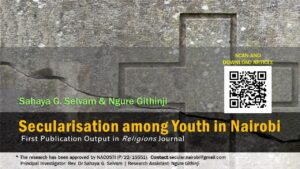
31st Sunday in Ordinary Time
The story of Zacchaeus (Lk 19:1-10)
Salvation: experience of justification of the righteous in the presence of Jesus
“I was a drunkard, but then one day I met Jesus, and I gave up drinking. Now I serve the Lord.” “I was not a believer, but then one day I met Jesus, and now my faith is unshakable.” “I was a womaniser, and one day I met Jesus….”
These are the common patterns in the testimonies of conversion that we hear in the context of some renewal prayer sessions. These stories are very plausible, and they touch me. Nevertheless they also raise a lot of questions in me: what is the experience of Jesus like for people who are basically good? Is the experience of Jesus always followed by dramatic signs? If people are good – as most people are […]
 30th Sunday in Ordinary Time – Year C
30th Sunday in Ordinary Time – Year C Secularisation and Spirituality among Lapsed-Christian Young Adults in Nairobi: An Exploratory Study of the Antecedents, Triggers, and Response
Secularisation and Spirituality among Lapsed-Christian Young Adults in Nairobi: An Exploratory Study of the Antecedents, Triggers, and Response 29th Sunday in Ordinary Time – Year C
29th Sunday in Ordinary Time – Year C Pastoral Supervision: Managing Psychosocial Challenges in Priestly Ministry
Pastoral Supervision: Managing Psychosocial Challenges in Priestly Ministry